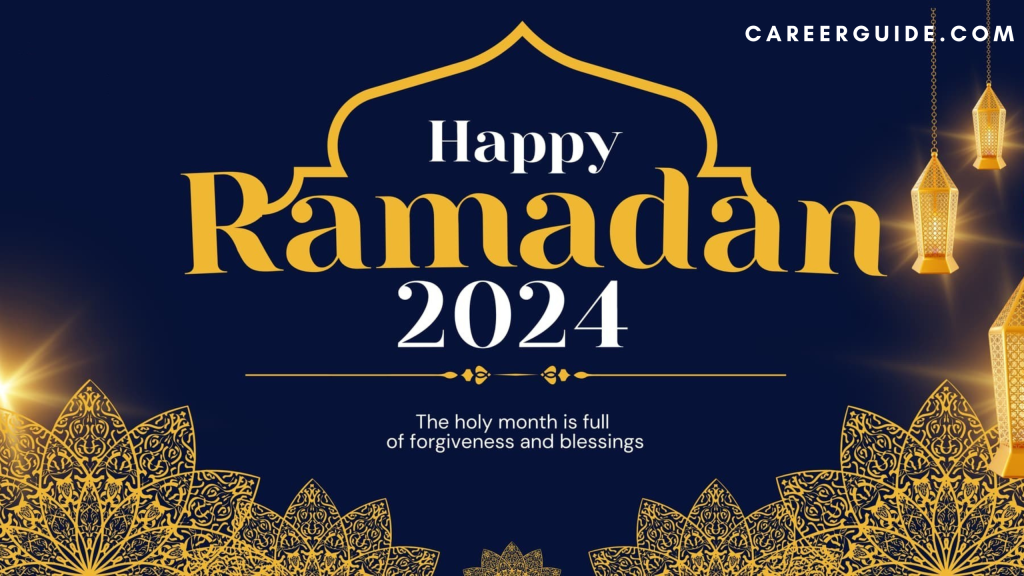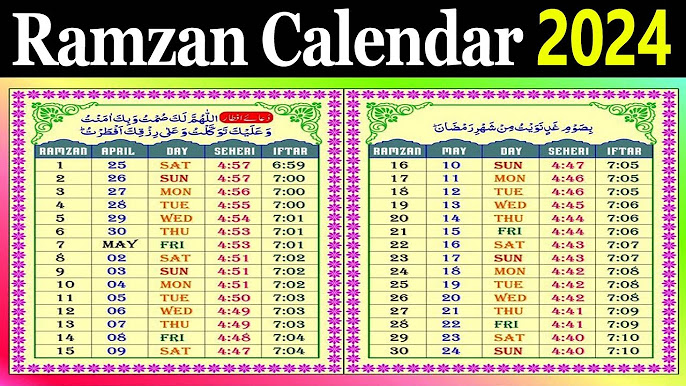As the Islamic calendar is based around the lunar cycle, the Holy month of Ramadan rotates by approximately ten days each year. Ramadan officially begins when the month of Shaban, the eighth month of the Islamic (Hijri) calendar, ends. This year, the holy month of Ramadan is expected to begin on Monday 11th March 2024. The exact timing is based on the sighting of the moon.
Eid al-Fitr, the Muslim celebration officially marks the end of Ramadan. The exact timing is based on the sighting of the moon. Eid al-Fitr officially begins at the start of the Islamic month of Shawwal, the tenth month of the Islamic (Hijri) calendar. This year, Ramadan is expected to end on Tuesday 9 April 2024, depending on the sighting of the moon.

Dates and Duration of Ramadan 2024
The exact dates and duration of Ramadan 2024 haven’t been officially confirmed yet as they depend on the sighting of the crescent moon. However, based on astronomical calculations, here’s an estimate:
Expected Start: March 10, 2024 (Sunday) Expected End: April 9, 2024 (Tuesday) Duration: 30 days
Important to Note:
- These are only estimations and the actual dates might vary slightly depending on local moonsighting.
- It’s essential to consult with your local religious authorities or Islamic calendars for the confirmed dates in your area.
- Remember that the lunar calendar follows a different cycle than the Gregorian calendar, which is why Ramadan moves by roughly 10-11 days each year.

Traditions of Ramadan
Beginning at puberty, all Muslims (with certain exceptions, such as if one is ill, travelling, pregnant, elderly, etc.) take part in the month-long, dawn-to-sunset fast that is the hallmark of Ramadan. Muslims believe that fasting cleanses the body, and the practice reminds them of the suffering of the poor.
Eating and drinking (including water) is prohibited from dawn to sunset, and the day’s abstinence is offset by a pre-dawn meal called sehri and a nightly meal known as iftar. For iftar, many traditionally break the fast by first eating dates, as the Prophet Muhammad is believed to have done to break his fast. Foods traditionally served at iftar vary, but food is often shared with a poor family during Ramadan.
At the end of the 29- or 30-day fast (depending on the length of the lunar cycle) is Eid al-Fitr (Festival of Breaking the Fast), when there is much feasting and celebration!
Suhoor and Iftar in 2024
Suhoor and Iftar are two essential components of the daily routine during the month of Ramadan for Muslims.
- Suhoor:
- Definition: Suhoor refers to the pre-dawn meal eaten before the fast begins at sunrise during the month of Ramadan.
- Purpose: The Suhoor meal is crucial as it provides sustenance for individuals throughout the day while they are fasting. It is consumed early in the morning before Fajr, the pre-dawn prayer.
- Contents: Suhoor typically includes a balanced and nutritious meal with components like complex carbohydrates, protein, fruits, and plenty of water to keep individuals energized and hydrated during the fasting hours.
- Iftar:
- Definition: Iftar is the evening meal with which Muslims break their fast at sunset.
- Timing: Iftar begins immediately after the Maghrib prayer, which is performed just after the sun sets.
- Breaking the Fast: Traditionally, the fast is broken with the eating of dates and drinking water, following the Sunnah (traditions of Prophet Muhammad, peace be upon him), and then individuals proceed to have a larger meal.
- Contents: Iftar meals vary across cultures but often include a variety of foods and beverages. It is common to start with dates and water, followed by soup, salads, main dishes, and desserts. It’s an opportunity for family and community members to come together and share a meal.
Both Suhoor and Iftar play significant roles in the spiritual and physical aspects of fasting during Ramadan. Suhoor helps individuals prepare for the day ahead, while Iftar marks the joyous moment of breaking the fast and sharing a communal meal with loved ones. These meals are also times for reflection, prayer, and gratitude.
Ramadan Decorations and Ambiance
Decorating for Ramadan is a cultural and personal practice that varies across different regions and households. Creating a warm and inviting ambiance during Ramadan often involves incorporating elements that reflect the spiritual significance of the month. Here are some common decorations and ideas:
- Lanterns (Fanous): Traditional lanterns, known as “fanous,” are popular decorations during Ramadan. These lanterns are often adorned with convoluted designs and colors. Hanging them or placing them on tables can add a festive touch to the ambiance.
- String Lights: Illuminating spaces with string lights creates a warm and inviting atmosphere. Consider using white or gold lights to symbolize purity and spirituality.
- Islamic Calligraphy: Artistic representations of Arabic calligraphy, featuring verses from the Quran or Islamic phrases, can be framed or displayed on walls. This adds a touch of elegance and reinforces the spiritual theme.
- Ramadan Banners and Garlands: Decorative banners or garlands with phrases like “Ramadan Mubarak” (Blessed Ramadan) can be hung in common areas. You can also create DIY banners with positive messages.
- Table Decor: Adorn the dining table with festive tablecloths, napkins, and placemats. Consider using metallic or jewel-toned colors to create an opulent feel. Add centerpieces with candles, flowers, or dates.
- Ramadan Calendars: Countdown calendars or charts can be a fun way to involve children in the excitement of Ramadan. Each day, a child can open a door or mark off a day until Eid.
- Prayer Area Decor: If you have a designated prayer area, decorate it with soft rugs, cushions, and prayer mats. Add small decorative items like candles or incense burners to create a serene space.
- Symbols of the Moon and Stars: As the Islamic calendar is lunar-based, incorporating symbols of the moon and stars into decorations is common. Crescent moon and star motifs can be integrated into various elements.
- Dates Display: Dates are traditionally used to break the fast, so consider having a beautifully arranged display of dates as both decoration and a practical element for Iftar.
- Scented Candles or Incense: Choose fragrances like oud, rose, or sandalwood to add a sensory element to your Ramadan ambience.
Ramadan and Health in 2024
Ramadan, the month of fasting, presents both potential benefits and challenges for your health. Let’s explore the key aspects of Ramadan and health:
Positive Aspects:
- Weight management: Fasting can lead to weight loss if done responsibly. However, remember not to focus solely on weight loss as the primary goal of Ramadan.
- Improved metabolic health: Studies suggest that رمضان fasting may positively impact cholesterol levels, blood sugar control, and insulin sensitivity.
- Detoxification: Fasting encourages your body to utilize stored energy, potentially promoting elimination of waste products.
- Mindfulness and self-discipline: The practice of mindful eating and self-control during Ramadan can benefit overall health and well-being.
- Increased hydration: Focusing on consuming adequate water during Suhoor and Iftar promotes proper hydration.
Challenges and Considerations:
- Nutritional deficiencies: The risk of missing out on essential nutrients exists, especially with unhealthy eating habits during Suhoor and Iftar.
- Dehydration: Especially in hot climates, staying adequately hydrated during the fasting period can be tricky.
- Fatigue and reduced energy: Especially in the beginning, adjusting to the fasting schedule can lead to fatigue and decreased energy levels.
- Digestive issues: Changes in eating patterns can disrupt digestive regularity and lead to constipation or indigestion.
- Pre-existing conditions: Consult your doctor before fasting if you have pre-existing medical conditions like diabetes, heart disease, or kidney problems.
Preparing for Eid al-Fitr in 2024
Eid al-Fitr in 2024, which is expected to begin on April 9th (subject to moon sighting), here are some ways you can prepare and celebrate:
Spiritual Preparation:
- Reflect on your Ramadan journey: Take time to contemplate your experiences, spiritual growth, and lessons learned during the holy month.
- Seek forgiveness and make amends: Forgive yourself and others, and strive to rectify any wrongs you may have committed.
- Increase your acts of worship: Engage in additional prayers, Quran recitation, and charity to enhance your spiritual connection.
Festive Preparations:
- Declutter and clean your home: Create a clean and welcoming space for yourself and guests.
- Decorate your home: Use lanterns, crescent moon motifs, flowers, and traditional decorations to create a festive atmosphere.
- Plan your Eid outfit: Wear your best clothes to mark the occasion and express joy.
- Prepare gifts for loved ones: Exchange gifts with family and friends to enhance the spirit of sharing and generosity.
- Plan Eid meals and treats: Prepare traditional dishes or try new recipes to share with loved ones. Consider making sweets like kunafa, gulab jamun, or sheer khurma.
Community Connections:
- Attend Eid prayers: Participate in communal prayers at the mosque to celebrate together and express gratitude.
- Organize or attend community gatherings: Share meals, celebrate, and exchange joy with friends, family, and neighbours.
- Visit the sick and elderly: Spread the festive spirit to those who might be unable to celebrate fully.
- Donate to charity: Continue the spirit of Ramadan by giving to those in need and supporting worthy causes.
Personal Enrichment:
- Set goals for the future: Use the occasion to reflect on your aspirations and set intentions for personal growth.
- Spend time with loved ones: Cherish these moments of togetherness and strengthen your bonds.
- Practice gratitude: Express thankfulness for your blessings, for the opportunity to observe Ramadan, and for the joy of Eid.
Additional Resources:
- Check with your local mosque: Stay updated on prayer times, community events, and specific arrangements for Eid celebrations.
- Find Eid recipes online: Explore diverse culinary traditions and discover new dishes to share with your loved ones.
- Learn about the significance of Eid al-Fitr: Gain a deeper understanding of the historical and spiritual meaning of the occasion.
Reflections on Ramadan 2024
Ramadan, people often reflect on their personal and spiritual growth, lessons in gratitude, generosity, and self-discipline. They consider the sense of community, appreciate their blessings, and think about forgiveness and reconciliation in relationships. Reflecting on the impact of fasting on health, lessons from challenges, and finding ways to integrate Ramadan values into daily life are common themes. Setting intentions for continuous improvement and carrying forward positive changes into the future is also part of post-Ramadan reflections. These reflections are deeply personal, and individuals may focus on different aspects based on their unique experiences during the month.
Frequently Asked Question
The dates of Ramadan are determined by the lunar Islamic calendar. Consult local Islamic authorities or online Islamic calendars for accurate information.
Ramadan is a holy month for Muslims, commemorating the time when the Quran was revealed to Prophet Muhammad (peace be upon him). It is a period of fasting, prayer, reflection, and increased devotion.
Muslims fast from dawn (Fajr prayer) until sunset (Maghrib prayer) during Ramadan.
Many people inquire about a celebrity’s presence on platforms like Instagram or Twitter to stay updated on their activities and thoughts.
Related posts:
- Top 7 universities in USA for hotel management
- Top 10 Career Options In Economics For Graduates in The USA
- Top 10 companies for graduates to work for in USA
- Top 10 Career Options in Law for Graduates in US
- Top 10 Media Companies to Work for in The USA After Graduation
- Top 10 career options for graduates in fashion industry in USA
- TOP 10 STARTUPS WHO EMPLOY GRADUATES IN USA
- TOP 10 TECH GIANTS WHO PROVIDE EMPLOYMENT TO GRADUATES IN USA




















